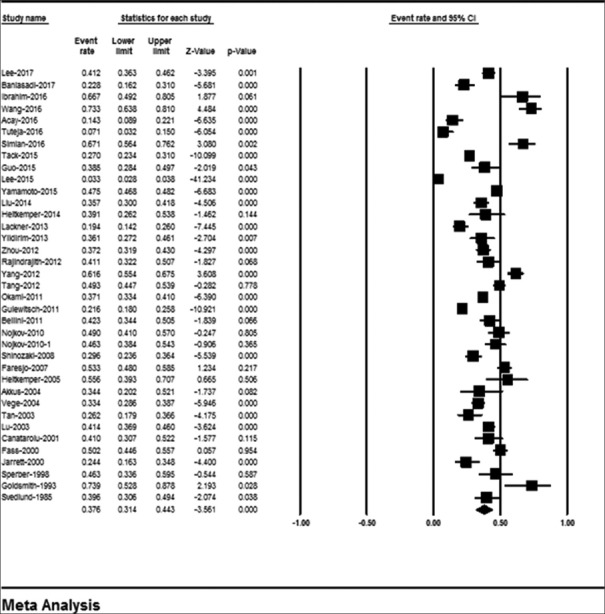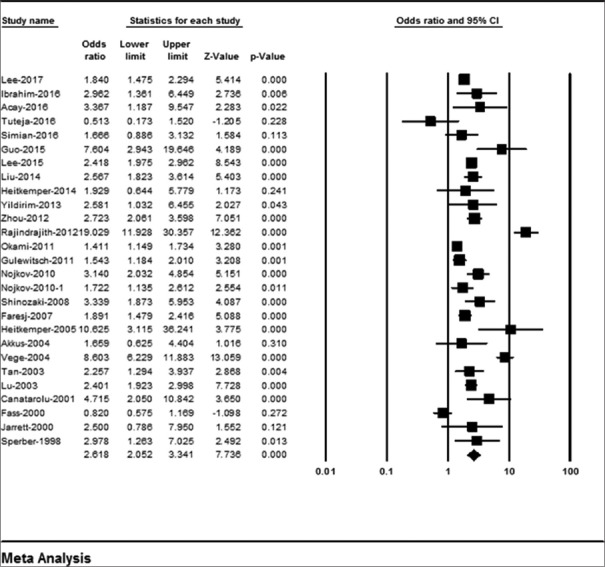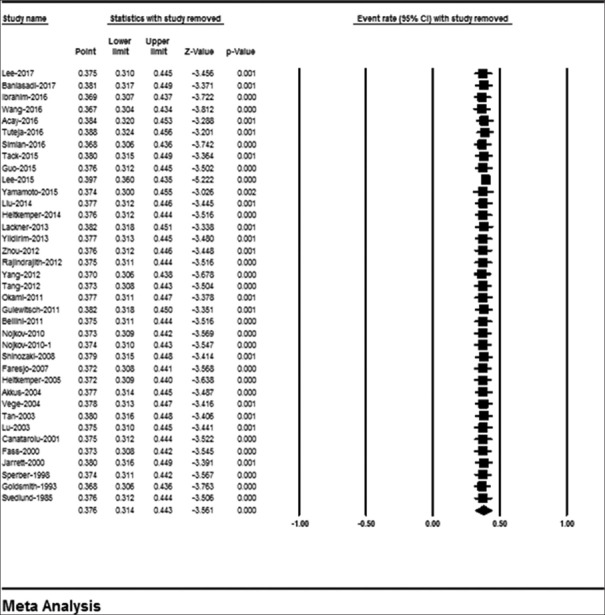Abstract
Background/Aims:
We conducted this meta-analysis to evaluate the prevalence of sleep disorder in irritable bowel syndrome (IBS) patients and study the association between IBS and sleep disorder.
Materials and Methods:
A systematic search was conducted by searching PubMed, Embase, and Cochrane library databases using the following search terms: “functional gastrointestinal disorders,” “Sleep disturbance,” “Sleep disorder,” “insomnia,” “Dysomnias,” “irritable bowel syndrome,” and “IBS.” Studies evaluating the association between IBS and sleep disorder were identified. Data analysis was conducted using meta-analysis software Comprehensive Meta-Analysis (CMA) 2.0. Heterogeneity across studies was evaluated by χ2 and I2 statistics. Publication bias was evaluated by funnel plot, Begg's test, and Egger's test. Sensitivity analysis was also performed by removing each single study separately.
Results:
The bibliographical search yielded a total of 2866 studies. Finally, 36 studies including 63620 participants were identified. The prevalence of sleep disorder in IBS was 37.6% (95% CI: 31.4% to 44.3%) based on this meta-analysis. The pooled odds ratio was 2.618 (95% CI: 2.052% to 3.341). Publication bias was not determined. Regarding the sensitivity analysis, the outcome was stable regardless of which study was removed.
Conclusions:
The prevalence of sleep disorder was higher in IBS compared to healthy controls and may be associated with the pathogenesis of IBS. The prevalence of sleep disorder in IBS may differ according to different areas, age, gender, occupation, and IBS diagnostic criteria. Further studies are needed to investigate any possible causal relationship between sleep disorder and IBS.
Keywords: Irritable bowel syndrome, meta-analysis, prevalence, sleep disorder
INTRODUCTION
Sleep disorders are common among general population,[1,2] and are determined by self-report questionnaires, polysomnography (PSG), or actigraphy.[3] The prevalence of sleep disorders varies in different countries. A meta-analysis conducted in 2006 demonstrated a female predisposition for insomnia.[4] Sleep disorders may also contribute to various health problems.[5] An association between functional gastrointestinal disorder and sleep disturbances has been identified.[6]
Irritable bowel syndrome (IBS) is a functional bowel disorder defined by recurrent abdominal pain related to defecation or a change in the frequency or appearance of stool.[7] The prevalence varied according to geographical location and was higher among women than men.[8] The etiology of IBS remains unclear. Genetics and environmental factors, visceral hypersensitivity, gut microbiota, disorder of the gut brain axis, and psychological factors were thought to be involved.[9] Some studies have reported that sleep disorders were common in IBS patients. To our knowledge, the prevalence of sleep disorders among IBS varies from 7.1% to 73.9%. Moreover, sleep disorders may be associated with greater gastrointestinal symptom severity.[10] The global prevalence of sleep disorders among IBS has not been investigated. The aim of this meta-analysis was to identify the pooled coexistence rates of sleep disorder and IBS and to explore the association between IBS and sleep disorder.
MATERIALS AND METHODS
Information sources
Relevant studies were identified by searching PubMed (till March 2017), EMBASE (till March 2017), and the Cochrane Central Register of Controlled trials (Issue 3 of 12, till March 2017).
Search
The search terms used for all databases included: (Functional gastrointestinal disorders and Sleep disturbance) OR (Functional gastrointestinal disorders and Sleep disorder) OR (Functional gastrointestinal disorders and insomnia) OR (Functional gastrointestinal disorders and dyssomnias) OR (Irritable bowel syndrome and sleep disturbance) OR (Irritable bowel syndrome and sleep disorder) OR (Irritable bowel syndrome and insomnia) OR (Irritable bowel syndrome and dyssomnias) OR (IBS and sleep disturbance) OR (IBS and sleep disorder) OR (IBS and insomnia) OR (IBS and dyssomnias). The search terms were slightly modified in different databases.
Study selection
The inclusion criteria included: (1) articles reporting prevalence of sleep disorder in IBS patients and (2) available information on sleep disorder prevalence and sample size.
Data extraction
Two independent investigators extracted the data using standardized data extraction forms. Any discrepancies were resolved by consensus. The data collected included year of publication, geographic region, study design, methods for assessing sleep disorder, diagnostic criteria for IBS, prevalence of sleep disorder, mean age, occupation, and proportion of female and male participants.
Summary measures
The data analysis was performed using the Comprehensive Meta-Analysis software, Version 2 (Biosta, Inc. USA). The proportion of individuals with sleep disorder in each trial was combined to achieve a pooled prevalence of sleep disorder. Moreover, pooled odds ratios (ORs) were calculated to evaluate the association between sleep disorder and IBS. All results are presented with 95% confidence intervals.
SYNTHESIS OF RESULTS
The degree of heterogeneity of the studies was evaluated using the χ2 test (with a value less than 0.1 considered significant) and the I2 test (25, 50, and 75% representing low, moderate, and high heterogeneity, respectively). If significant heterogeneity (P < 0.1 or I2 > 50%) was achieved, we used the random effect model to combine the effect sizes in these groups. Subgroup analyses were also performed to assess the effect of geographic region, gender, occupation, age, diagnostic criteria for IBS, and publication year. To assess the stability of the results, sensitivity analysis was also performed by excluding every single study respectively. Publication bias was assessed by egger's test and funnel plots.
RESULTS
Selection of studies
A total of 2866 studies were identified, of which 2581 studies were removed according to titles and abstracts. Then, 96 duplicate studies were excluded, leaving 189 records to be examined. On reviewing full-text articles, 67 unrelated studies, 34 reviews, 3 studies including participants with complications, and 49 studies with insufficient data were excluded. Finally, 36[11,12,13,14,15,16,17,18,19,20,21,22,23,24,25,26,27,28,29,30,31,32,33,34,35,36,37,38,39,40,41,42,43,44,45,46] studies including 63620 participants were identified [Figure 1 and Table 1].
Figure 1.
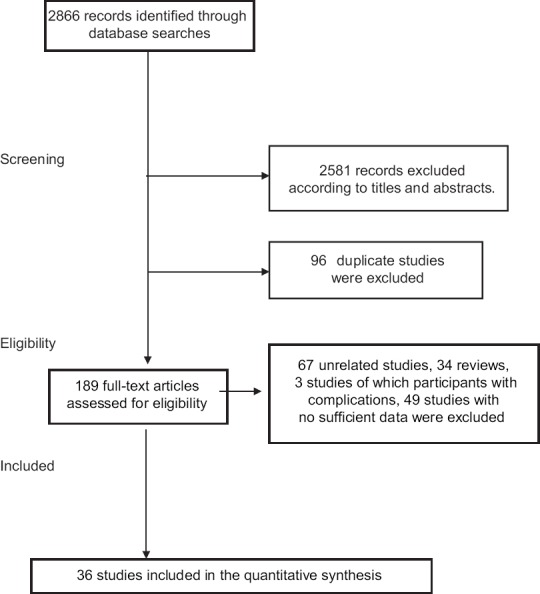
Flow diagram for the selection of studies
Table 1.
Characteristics of included studies of quadruple regimens versus other regimens
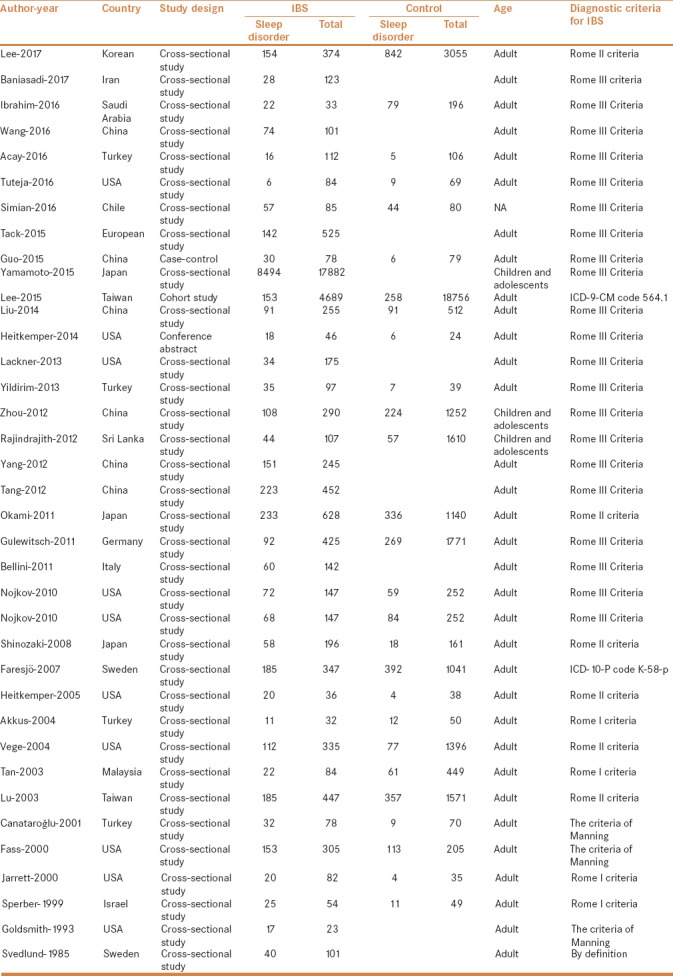
The sample size of these studies ranged between 23 and 23445. Of the 36 studies, 34 studies were cross-sectional studies, 1 study was a case-control study, and 1 study was a cohort study. Furthermore, 26 studies investigated the prevalence of sleep disorder among IBS patients and evaluated the association between IBS and sleep disorder; the other 10 studies only explored the prevalence of sleep disorder among IBS patients. All these studies used subjective sleep measures to assess sleep quality.
Sleep disorders and irritable bowel syndrome
The pooled prevalence of sleep disorders among IBS was 37.6% (95% CI: 31.4% to 44.3%) [Figure 2]. A significant association was also identified between sleep disorders and IBS. The summary odds ratio was 2.618 (95% CI: 2.052% to 3.341) [Figure 3]. The results were stable no matter which study was excluded according to sensitivity analysis [Figure 4].
Figure 2.
The pooled prevalence of sleep disorders among IBS
Figure 3.
The summary odds ratio of sleep disorders among IBS
Figure 4.
Sensitivity analysis
Publication bias
No significant publication bias was identified by funnel plot [Figure 5]. Egger's regression test (P = 0.34) and Begg's test (P = 0.69) also did not show significant bias [Table 2].
Figure 5.
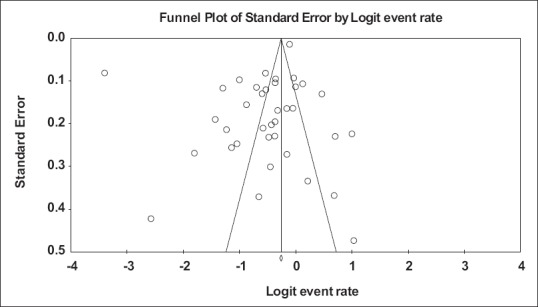
Funnel plot
Table 2.
Results of meta-analyses/subgroup analyses
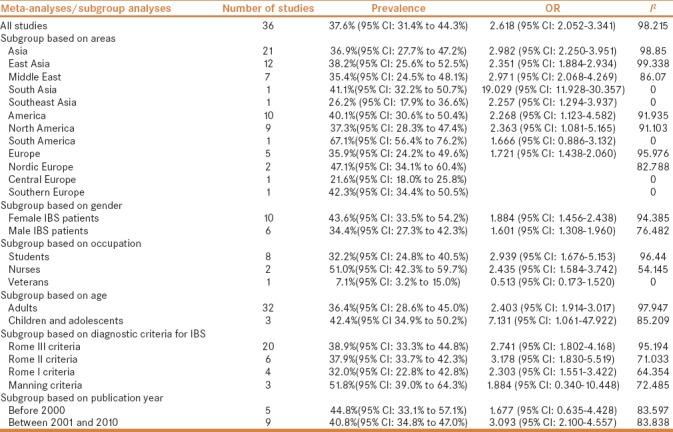
Sleep disorders and irritable bowel syndrome based on areas
Twenty-one studies were conducted in Asia (12 in East Asia, 7 in Middle East, 1 in South Asia, and 1 in Southeast Asia). The prevalence of sleep disorders among IBS in Asia was 36.9% (95% CI: 27.7% to 47.2%). The prevalence in East Asia, Middle East, South Asia, and Southeast Asia was 38.2% (95% CI: 25.6% to 52.5%), 35.4% (95% CI: 24.5% to 48.1%), 41.1% (95% CI: 32.2% to 50.7%), and 26.2% (95% CI: 17.9% to 36.6%), respectively. The pooled OR of sleep disorders was 2.982 (95% CI: 2.250 to 3.951) among populations with IBS in Asia. The pooled ORs in East Asia, Middle East, South Asia, and Southeast Asia were 2.351 (95% CI: 1.884 to 2.934), 2.971 (95% CI: 2.068 to 4.269), 19.029 (95% CI: 11.928 to 30.357), and 2.257 (95% CI: 1.294 to 3.937), respectively.
Ten studies were conducted in America (9 studies in North America and 1 in South America). The prevalence of sleep disorders among IBS in America was 40.1% (95% CI: 30.6% to 50.4%). The prevalence in North America and South America was 37.3% (95% CI: 28.3% to 47.4%) and 67.1% (95% CI: 56.4% to 76.2%), respectively. The pooled OR of sleep disorders was 2.268 (95% CI: 1.123 to 4.582) among populations with IBS in America. The pooled ORs in North America and South America were 2.363 (95% CI: 1.081 to 5.165) and 1.666 (95% CI: 0.886 to 3.132).
Five studies were conducted in Europe (2 in Nordic Europe, 1 in Central Europe, 1 in Southern Europe, and 1 multicenter study). The prevalence of sleep disorders among IBS in Europe was 35.9% (95% CI: 24.2% to 49.6%). The prevalence in Nordic Europe, Central Europe, and Southern Europe was 47.1% (95% CI: 34.1% to 60.4%), 21.6% (95% CI: 18.0% to 25.8%), and 42.3% (95% CI: 34.4% to 50.5%), respectively. Only 2 studies conducted in Europe evaluated the association between sleep disorders and IBS (1 study conducted in Nordic Europe and 1 multicenter study). The pooled OR of sleep disorders was 1.721 (95% CI: 1.438 to 2.060) among populations with IBS in Europe.
Sleep disorders and irritable bowel syndrome based on gender
Data regarding gender were available from 10 studies. The prevalence of sleep disorders among female IBS was 43.6% (95% CI: 33.5% to 54.2%). The pooled OR of sleep disorders was 1.884 (95% CI: 1.456 to 2.438) among females with IBS. The prevalence of sleep disorders among males with IBS was 34.4% (95% CI: 27.3% to 42.3%). The pooled OR of sleep disorders was 1.601 (95% CI: 1.308 to 1.960) among males with IBS.
Sleep disorders and irritable bowel syndrome based on occupation
Data regarding occupation were available from 11 studies. Eight studies were conducted among students, 2 were conducted among nurses, and 1 was conducted among veterans. The prevalence of sleep disorders among IBS in students, nurses, and veterans were 32.2% (95% CI: 24.8% to 40.5%), 51.0% (95% CI: 42.3% to 59.7%), and 7.1% (95% CI: 3.2% to 15.0%), respectively. The pooled ORs in students, nurses, and veterans were 2.939 (95% CI: 1.676 to 5.153), 2.435 (95% CI: 1.584 to 3.742), and 0.513 (95% CI: 0.173 to 1.520), respectively.
Sleep disorders and irritable bowel syndrome based on age
Data regarding age were available from 35 studies. Thirty-two studies were conducted among adults and 3 studies were conducted among children and adolescents. The prevalence of sleep disorders was 36.4% (95% CI: 28.6% to 45.0%) among adult IBS patients and 42.4% (95% CI: 34.9% to 50.2%) among children and adolescent IBS patients. The pooled ORs were 2.403 (95% CI: 1.914 to 3.017) and 7.131 (95% CI: 1.061 to 47.922), respectively.
Sleep disorders and irritable bowel syndrome based on diagnostic criteria for irritable bowel syndrome
Among 36 identified studies, 20 used Rome III criteria, 6 used Rome II criteria, 4 used Rome I criteria, 3 used Manning criteria, and the remaining 3 did not mention specific diagnostic criteria. The prevalence of sleep disorders among IBS diagnosed by Rome III criteria, Rome II criteria, Rome I criteria, and manning criteria were 38.9% (95% CI: 33.3% to 44.8%), 37.9% (95% CI: 33.7% to 42.3%), 32.0% (95% CI: 22.8% to 42.8%), and 51.8% (95% CI: 39.0% to 64.3%), respectively. The pooled ORs were 2.741 (95% CI: 1.802 to 4.168), 3.178 (95% CI: 1.830 to 5.519), 2.303 (95% CI: 1.551 to 3.422), and 1.884 (95% CI: 0.340 to 10.448), respectively.
Sleep disorders and irritable bowel syndrome based on publication year
Five studies were published before 2000, 9 were published between 2001 and 2010, and 22 were published between 2011 and 2017. The prevalence of sleep disorders among IBS during these years were 44.8% (95% CI: 33.1% to 57.1%), 40.8% (95% CI: 34.8% to 47.0%), and 34.6% (95% CI: 25.7% to 44.7%), respectively. The pooled ORs were 1.677 (95% CI: 0.635 to 4.428), 3.093 (95% CI: 2.100 to 4.557), and 2.542 (95% CI: 1.827 to 3.536), respectively.
DISCUSSION
This is the first meta-analysis examining the prevalence of sleep disorders among IBS patients. The results of this meta-analysis involving 36 studies showed that sleep disorders were common in IBS and the prevalence rate was 37.6% (95% CI: 31.4% to 44.3%). The pooled ORs revealed that sleep disorders were significantly associated with IBS.
The reason why sleep disorders are associated with IBS remains unclear. The gut–brain axis plays an important role in the pathogenesis of IBS. Central nervous system (CNS), autonomic nervous system (ANS), enteric nervous system (ENS), and hypothalamic pituitary adrenal (HPA) axis are thought to be involved.[47] Several studies found that sleep deprivation led to modification of the ANS activity indicating that sleep disorder may be associated with autonomic dysregulation.[48,49] The HPA axis has been reported to be inhibited by sleep and sleep disorder may result in a 24-hour increased secretion of ACTH and cortisol.[50] Moreover, the symptoms of IBS, such as abdominal pain, may activate sympathetic nervous system and reduce sleep efficiency.[51] The impact of altered microbiota on the development of IBS has been considered more seriously. Similar mechanism may exist between sleep and gut microbiota. Gut microbes may affect sleep status via degradation products such as muramyl peptides (MPs), lipopolysaccharide (LPS),[52] and melatonin.[53] These degradation products could activate immune cells leading to the release of cytokines, which could affect sleep. A recent study found short chain fat acids and microbiota metabolites might have a potential impact on central and hepatic circadian rhythm.[54] In return, circadian disorganization has been reported to alter the composition of gut microbiota under high-fat, high-sugar diet conditions in mice.[55] Chronic sleep disruption can also cause reversible changes in gut microbiota.[56] Sleep quality assessed by Pittsburgh sleep quality index was also found to be related to the composition of the gut microbiome in healthy older adults.[57] However, the results were controversial. A study reported the overall composition of gut microbiota maintained after several consecutive days of sleep restriction.[58] Overall, although the reason for sleep disorders seen commonly among IBS patients is obscure, gut–brain–microbiota axis disorder may underlie this association.
According to subgroup analysis, the prevalence of sleep disorders among IBS varied slightly in different geographical locations. We also found that the prevalence of sleep disorders among female IBS patients was higher than male IBS patients, however, the difference was not significant. Higher risk of sleep disorder and IBS in females compared with males has been reported by many studies. Sex hormones,[59] difference in visceral and somatic pain sensitivity, central processing of visceral stimuli, genetics, and immunologic/microbiome[60] may be causal factors. Occupation subgroup analysis showed that nurses with IBS might have a higher risk of suffering from sleep disorders. Part of the reason may be the demanding, stressful working conditions. Age subgroup analysis revealed that the prevalence of sleep disorders among children and adolescents with IBS was higher than that among adults, but with no statistically significant difference. Academic stress may be an explanatory factor for this observation. Different IBS diagnostic criteria may lead to differences in prevalence based on subgroup analysis. The prevalence of sleep disorders among IBS seemed to be declining on the basis of publication year subgroup analysis, however, these differences were not statistically significant.
There are some limitations of our meta-analyses. First, significant heterogeneity was found when data were pooled. Reasons for this heterogeneity may be different characteristics among identified studies. The random-effects model was used to provide a more conservative result. We hope our meta-analyses could show an epidemiologic and global perspective of the prevalence of sleep disorders among IBS patients. Second, most identified studies (34 of 36) in this meta-analysis were cross-sectional studies. We could only describe the association between sleep disorders and IBS but could not determine the cause. More case-control and cohort studies are needed to investigate the substantial causal relationship. Third, all included studies assessed sleep disorders using a subjective questionnaire. Objective measures may be more convincing.
In conclusion, this meta-analysis demonstrated a global prevalence of sleep disorders among IBS and identified an underlying association between them. Different geographical locations, age, gender, occupations, and IBS diagnostic criteria may affect the prevalence of sleep disorders in IBS. Further case-control and cohort studies are needed to elucidate a substantial causal relationship.
Financial support and sponsorship
Nil.
Conflicts of interest
There are no conflicts of interest.
REFERENCES
- 1.Cao X, Wang S, Zhong B, Zhang L, Ungvari GS, Ng CH, et al. The prevalence of insomnia in the general population in China: A meta-analysis. Plos One. 2017;12:e0170772. doi: 10.1371/journal.pone.0170772. [DOI] [PMC free article] [PubMed] [Google Scholar]
- 2.Colten HR, Bruce M. Sleep Disorders and Sleep Deprivation: An Unmet Public Health Problem. Washington (DC): National Academies Press (US); 2006. [PubMed] [Google Scholar]
- 3.Kushida CA, Chang A, Gadkary C, Guilleminault C, Carrillo O, Dement WC. Comparison of actigraphic, polysomnographic, and subjective assessment of sleep parameters in sleep-disordered patients. Sleep Med. 2001;2:389–96. doi: 10.1016/s1389-9457(00)00098-8. [DOI] [PubMed] [Google Scholar]
- 4.Zhang B, Wing YK. Sex differences in insomnia: A meta-analysis. Sleep. 2006;29:85–93. doi: 10.1093/sleep/29.1.85. [DOI] [PubMed] [Google Scholar]
- 5.Luyster FS, Strollo PJ, Zee PC, Walsh JK. Sleep: A Health Imperative. Sleep. 2012;35:727–34. doi: 10.5665/sleep.1846. [DOI] [PMC free article] [PubMed] [Google Scholar]
- 6.Khanijow V, Prakash P, Emsellem HA, Borum ML, Doman DB. Sleep Dysfunction and Gastrointestinal Diseases. Gastroenterol Hepatol. 2015;11:817–25. [PMC free article] [PubMed] [Google Scholar]
- 7.Mearin F, Lacy BE, Chang L, Chey WD, Lembo AJ, Simren M, et al. Bowel Disorders. Gastroenterology. 2016;150:1393–407.e5. doi: 10.1053/j.gastro.2016.02.031. [DOI] [PubMed] [Google Scholar]
- 8.Lovell RM, Ford AC. Global Prevalence of and Risk Factors for Irritable Bowel Syndrome: A Meta-analysis. Clin Gastroenterol Hepatol. 2012;10:712–21.e4. doi: 10.1016/j.cgh.2012.02.029. [DOI] [PubMed] [Google Scholar]
- 9.Ford AC, Lacy BE, Talley NJ. Irritable Bowel Syndrome. N Engl J Med. 2017;376:2566–78. doi: 10.1056/NEJMra1607547. [DOI] [PubMed] [Google Scholar]
- 10.Patel A, Hasak S, Cassell B, Ciorba MA, Vivio EE, Kumar M, et al. Effects of disturbed sleep on gastrointestinal and somatic pain symptoms in irritable bowel syndrome. Aliment Pharmacol Ther. 2016;44:246–58. doi: 10.1111/apt.13677. [DOI] [PMC free article] [PubMed] [Google Scholar]
- 11.Svedlund J, Sjodin I, Dotevall G, Gillberg R. Upper gastrointestinal and mental symptoms in the irritable bowel syndrome. Scand J Gastroenterol. 1985;20:595–601. doi: 10.3109/00365528509089702. [DOI] [PubMed] [Google Scholar]
- 12.Goldsmith G, Levin JS. Effect of sleep quality on symptoms of irritable bowel syndrome. Dig Dis Sci. 1993;38:1809–14. doi: 10.1007/BF01296103. [DOI] [PubMed] [Google Scholar]
- 13.Sperber AD, Atzmon Y, Neumann L, Weisberg I, Shalit Y, Abu-Shakrah M, et al. Fibromyalgia in the irritable bowel syndrome: Studies of prevalence and clinical implications. Am J Gastroenterol. 1999;94:3541–6. doi: 10.1111/j.1572-0241.1999.01643.x. [DOI] [PubMed] [Google Scholar]
- 14.Fass R, Fullerton S, Tung S, Mayer EA. Sleep disturbances in clinic patients with functional bowel disorders. Am J Gastroenterol. 2000;95:1195–2000. doi: 10.1111/j.1572-0241.2000.02009.x. [DOI] [PubMed] [Google Scholar]
- 15.Jarrett M, Heitkemper M, Cain KC, Burr RL, Hertig V. Sleep disturbance influences gastrointestinal symptoms in women with irritable bowel syndrome. Dig Dis Sci. 2000;45:952–9. doi: 10.1023/a:1005581226265. [DOI] [PubMed] [Google Scholar]
- 16.Canataroğlu A, Gümürdülü Y, Erdem A, Çolakoğlu S. Prevalence of fibromyalgia in patients with irritable bowel syndrome. Turk J Gastroenterol. 2001;12:141–4. [Google Scholar]
- 17.Tan YM, Goh KL, Muhidayah R, Ooi CL, Salem O. Prevalence of irritable bowel syndrome in young adult Malaysians: A survey among medical students. J Gastroenterol Hepatol. 2003;18:1412–6. doi: 10.1046/j.1440-1746.2003.03212.x. [DOI] [PubMed] [Google Scholar]
- 18.Lu CL, Chen CY, Lang HC, Luo JC, Wang SS, Chang FY, et al. Current patterns of irritable bowel syndrome in Taiwan: The Rome II questionnaire on a Chinese population. Aliment Pharmacol Ther. 2003;18:1159–69. doi: 10.1046/j.1365-2036.2003.01711.x. [DOI] [PubMed] [Google Scholar]
- 19.Vege SS, Locke GR, Weaver AL, Farmer SA, Melton LR, Talley NJ. Functional gastrointestinal disorders among people with sleep disturbances: A population-based study. Mayo Clin Proc. 2004;79:1501–6. doi: 10.4065/79.12.1501. [DOI] [PubMed] [Google Scholar]
- 20.Akkus S, Senol A, Ayvacioglu NB, Tunc E, Eren I, Isler M. Is female predominance in irritable bowel syndrome related to fibromyalgia? Rheumatol Int. 2004;24:106–9. doi: 10.1007/s00296-003-0328-x. [DOI] [PubMed] [Google Scholar]
- 21.Heitkemper M, Jarrett M, Burr R, Cain KC, Landis C, Lentz M, et al. Subjective and objective sleep indices in women with irritable bowel syndrome. Neurogastroenterol Motil. 2005;17:523–30. doi: 10.1111/j.1365-2982.2005.00700.x. [DOI] [PubMed] [Google Scholar]
- 22.Faresjö Š, Grodzinsky E, Johansson S, Wallander MA, Timpka T, Škerlind I. Psychosocial factors at work and in every day life are associated with irritable bowel syndrome. Eur J Epidemiol. 2007;22:473–80. doi: 10.1007/s10654-007-9133-2. [DOI] [PubMed] [Google Scholar]
- 23.Shinozaki M, Fukudo S, Hongo M, Shimosegawa T, Sasaki D, Matsueda K, et al. High prevalence of irritable bowel syndrome in medical outpatients in Japan. J Clin Gastroenterol. 2008;42:1010–6. doi: 10.1097/MCG.0b013e318150d006. [DOI] [PubMed] [Google Scholar]
- 24.Nojkov B, Rubenstein JH, Chey WD, Hoogerwerf WA. The impact of rotating shift work on the prevalence of irritable bowel syndrome in nurses. Am J Gastroenterol. 2010;105:842–7. doi: 10.1038/ajg.2010.48. [DOI] [PMC free article] [PubMed] [Google Scholar]
- 25.Bellini M, Gemignani A, Gambaccini D, Toti S, Menicucci D, Stasi C, et al. Evaluation of latent links between irritable bowel syndrome and sleep quality. World J Gastroenterol. 2011;17:5089–96. doi: 10.3748/wjg.v17.i46.5089. [DOI] [PMC free article] [PubMed] [Google Scholar]
- 26.Okami Y, Kato T, Nin G, Harada K, Aoi W, Wada S, et al. Lifestyle and psychological factors related to irritable bowel syndrome in nursing and medical school students. J Gastroenterol. 2011;46:1403–10. doi: 10.1007/s00535-011-0454-2. [DOI] [PubMed] [Google Scholar]
- 27.Gulewitsch MD, Enck P, Hautzinger M, Schlarb AA. Irritable bowel syndrome symptoms among German students: Prevalence, characteristics, and associations to somatic complaints, sleep, quality of life, and childhood abdominal pain. Eur J Gastroenterol Hepatol. 2011;23:311–6. doi: 10.1097/MEG.0b013e3283457b1e. [DOI] [PubMed] [Google Scholar]
- 28.Tang YR, Yang WW, Wang YL, Lin L. Sex differences in the symptoms and psychological factors that influence quality of life in patients with irritable bowel syndrome. Eur J Gastroenterol Hepatol. 2012;24:702–7. doi: 10.1097/MEG.0b013e328351b2c2. [DOI] [PubMed] [Google Scholar]
- 29.Rajindrajith S, Devanarayana NM. Subtypes and symptomatology of irritable bowel syndrome in children and adolescents: A school-based survey using Rome III criteria. J Neurogastroenterol Motil. 2012;18:298–304. doi: 10.5056/jnm.2012.18.3.298. [DOI] [PMC free article] [PubMed] [Google Scholar]
- 30.Yang WW, Tang YR, Xu XY, Wang YL, Lin L. Influence of insomnia and insomnia-related psychological factors on symptoms of female patients with irritable bowel syndrome. World Chinese J Digestology. 2012;20:2840–4. [Google Scholar]
- 31.Zhou HQ, Yao M, Chen WB, Sun MF, Cheng GY, Chen YP, et al. High prevalence of irritable bowel syndrome with poor sleep quality in children and adolescents in Shanghai. Sleep Biol Rhythms. 2012;10:179–86. [Google Scholar]
- 32.Lackner JM, Ma CX, Keefer L, Brenner DM, Gudleski GD, Satchidanand N, et al. Type, rather than number, of mental and physical comorbidities increases the severity of symptoms in patients with irritable bowel syndrome. Clin Gastroenterol Hepatol. 2013;11:1147–57. doi: 10.1016/j.cgh.2013.03.011. [DOI] [PMC free article] [PubMed] [Google Scholar]
- 33.Yildirim O, Alçelik A, Canan F, Aktaş G, Sit M, Işçi A, et al. Impaired subjective sleep quality in irritable bowel syndrome patients with a Type D personality. Sleep Biol Rhythms. 2013;11:135–8. [Google Scholar]
- 34.Liu Y, Liu L, Yang Y, He Y, Zhang Y, Wang M, et al. A school-based study of irritable bowel syndrome in medical students in Beijing, china: Prevalence and some related factors. Gastroenterol Res Pract 2014. 2014:124261. doi: 10.1155/2014/124261. [DOI] [PMC free article] [PubMed] [Google Scholar]
- 35.Heitkemper M, Jarrett M, Raftery D, Djukovic D, Gu H, Cain K. Serum tryptophan metabolite profiling during sleep in patients with and without Irritable Bowel Syndrome (IBS) Gastroenterology. 2014;146:S–536. doi: 10.1177/1099800415594251. [DOI] [PMC free article] [PubMed] [Google Scholar]
- 36.Lee YT, Hu LY, Shen CC, Huang MW, Tsai SJ, Yang AC, et al. Risk of Psychiatric Disorders following Irritable Bowel Syndrome: A Nationwide Population-Based Cohort Study. PLoS One. 2015;10:e0133283. doi: 10.1371/journal.pone.0133283. [DOI] [PMC free article] [PubMed] [Google Scholar]
- 37.Yamamoto R, Kaneita Y, Osaki Y, Kanda H, Suzuki K, Higuchi S, et al. Irritable bowel syndrome among Japanese adolescents: A nationally representative survey. J Gastroenterol Hepatol. 2015;30:1354–60. doi: 10.1111/jgh.12974. [DOI] [PubMed] [Google Scholar]
- 38.Tack J, Stanghellini V, Mearin F, Yannakou Y, Layer P, Coffin B, et al. Diagnosis and management of moderate-to-severe irritable bowel syndrome with constipation (IBS-C) in Europe: Pooled results from the IBIS-C study. United Eur Gastroenterol J. 2015;3:A272–3. [Google Scholar]
- 39.Guo YB, Zhuang KM, Kuang L, Zhan Q, Wang XF, Liu SD. Association between diet and lifestyle habits and irritable bowel syndrome: A case-control study. Gut Liver. 2015;9:649–56. doi: 10.5009/gnl13437. [DOI] [PMC free article] [PubMed] [Google Scholar]
- 40.Ibrahim NK, Al-Bloushy RI, Sait SH, Al-Azhary HW, Al BN, Mirdad GA. Irritable bowel syndrome among nurses working in King Abdulaziz University Hospital, Jeddah, Saudi Arabia. Libyan J Med. 2016;11:30866. doi: 10.3402/ljm.v11.30866. [DOI] [PMC free article] [PubMed] [Google Scholar]
- 41.Acay A, Bal A, Oruc S, Ozkececi T, Sariaydin M, Demirbas H, et al. Does frequen cy of restless legs syndrome and poor sleep quality increase with age in irritable bowel syndrome? Wien Klin Wochenschr. 2016;128:604–9. doi: 10.1007/s00508-016-1065-y. [DOI] [PubMed] [Google Scholar]
- 42.Tuteja AK, Tolman KG, Stoddard G, Talley NJ, Verne GN. Comorbidity with the irritable bowel syndrome in gulf war veterans-links to fatigue, sleep disorder and gastroesophageal reflux disease. Gastroenterology. 2016;150:S734. [Google Scholar]
- 43.Simian D, Moreno M, Flores L, Ibáñez P, Figueroa C, Lubascher J, et al. Quality of sleep in Chilean IBD patients. Inflamm Bowel Dis. 2016;22:S31–2. [Google Scholar]
- 44.Wang C, Wang Q, Song J, Xie L, Yuan S, Li X. Effects of psychological abnormalities on life quality, sleep quality and symptom severity in patients with irritable bowel syndrome. Chinese J Gastroenterol. 2016;21:34–8. [Google Scholar]
- 45.Baniasadi N, Dehesh MM, Mohebbi E, Hayatbakhsh AM, Oghabian Z. Assessing the sleep quality and depression-anxiety-stress in irritable bowel syndrome patients. Arq Gastroenterol. 2017;54:163–6. doi: 10.1590/S0004-2803.201700000-08. [DOI] [PubMed] [Google Scholar]
- 46.Lee SK, Yoon DW, Lee S, Kim J, Choi KM, Shin C. The association between irritable bowel syndrome and the coexistence of depression and insomnia. J Psychosom Res. 2017;93:1–5. doi: 10.1016/j.jpsychores.2016.12.007. [DOI] [PubMed] [Google Scholar]
- 47.Carabotti M, Scirocco A, Maselli MA, Severi C. The gut-brain axis: Interactions between enteric microbiota, central and enteric nervous systems. Ann Gastroenterol. 2015;28:203–9. [PMC free article] [PubMed] [Google Scholar]
- 48.Miglis MG. Autonomic dysfunction in primary sleep disorders. Sleep Med. 2016;19:40–9. doi: 10.1016/j.sleep.2015.10.001. [DOI] [PubMed] [Google Scholar]
- 49.Tobaldini E, Costantino G, Solbiati M, Cogliati C, Kara T, Nobili L, et al. Sleep, sleep deprivation, autonomic nervous system and cardiovascular diseases. Neurosci Biobehav Rev. 2017;74:321–9. doi: 10.1016/j.neubiorev.2016.07.004. [DOI] [PubMed] [Google Scholar]
- 50.Vgontzas AN, Chrousos GP. Sleep, the hypothalamic-pituitary-adrenal axis, and cytokines: Multiple interactions and disturbances in sleep disorders. Endocrinol Metab Clin North Am. 2002;31:15–36. doi: 10.1016/s0889-8529(01)00005-6. [DOI] [PubMed] [Google Scholar]
- 51.Schlereth T, Birklein F. The sympathetic nervous system and pain. Neuromolecular Med. 2008;10:141–7. doi: 10.1007/s12017-007-8018-6. [DOI] [PubMed] [Google Scholar]
- 52.Krueger JM, Opp MR. Sleep and Microbes. Int Rev Neurobiol. 2016;131:207–25. doi: 10.1016/bs.irn.2016.07.003. [DOI] [PMC free article] [PubMed] [Google Scholar]
- 53.Wong RK, Yang C, Song GH, Wong J, Ho KY. Melatonin regulation as a possible mechanism for probiotic (VSL#3) in irritable bowel syndrome: A randomized double-blinded placebo study. Dig Dis Sci. 2015;60:186–94. doi: 10.1007/s10620-014-3299-8. [DOI] [PubMed] [Google Scholar]
- 54.Leone V, Gibbons SM, Martinez K, Hutchison AL, Huang EY, Cham CM, et al. Effects of diurnal variation of gut microbes and high-fat feeding on host circadian clock function and metabolism. Cell Host Microbe. 2015;17:681–9. doi: 10.1016/j.chom.2015.03.006. [DOI] [PMC free article] [PubMed] [Google Scholar]
- 55.Voigt RM, Forsyth CB, Green SJ, Mutlu E, Engen P, Vitaterna MH, et al. Circadian disorganization alters intestinal microbiota. PLoS One. 2014;9:e97500. doi: 10.1371/journal.pone.0097500. [DOI] [PMC free article] [PubMed] [Google Scholar]
- 56.Poroyko VA, Carreras A, Khalyfa A, Khalyfa AA, Leone V, Peris E, et al. Chronic Sleep Disruption Alters Gut Microbiota, Induces Systemic and Adipose Tissue Inflammation and Insulin Resistance in Mice. Scientific Rep. 2016;6:35405. doi: 10.1038/srep35405. [DOI] [PMC free article] [PubMed] [Google Scholar]
- 57.Anderson JR, Carroll I, Azcarate-Peril MA, Rochette AD, Heinberg LJ, Peat C, et al. A preliminary examination of gut microbiota, sleep, and cognitive flexibility in healthy older adults. Sleep Med. 2017;38:104–7. doi: 10.1016/j.sleep.2017.07.018. [DOI] [PMC free article] [PubMed] [Google Scholar]
- 58.Zhang SL, Bai L, Goel N, Bailey A, Jang CJ, Bushman FD, et al. Human and rat gut microbiome composition is maintained following sleep restriction. Proc Natl Acad Sci U S A. 2017;114:E1564–71. doi: 10.1073/pnas.1620673114. [DOI] [PMC free article] [PubMed] [Google Scholar]
- 59.Mong JA, Cusmano DM. Sex differences in sleep: Impact of biological sex and sex steroids. Philos Trans R Soc Lond B Biol Sci. 2016;371:20150110. doi: 10.1098/rstb.2015.0110. [DOI] [PMC free article] [PubMed] [Google Scholar]
- 60.Houghton LA, Heitkemper M, Crowell M, Emmanuel A, Halpert A, McRoberts JA, et al. Age, Gender and Women's Health and the Patient. Gastroenterology. 2016;150:1332–43. doi: 10.1053/j.gastro.2016.02.017. [DOI] [PubMed] [Google Scholar]



